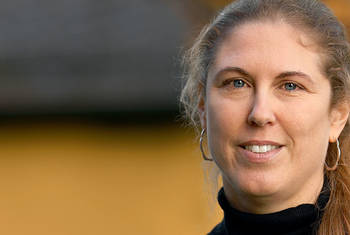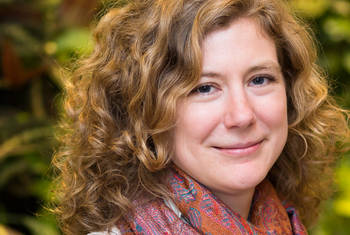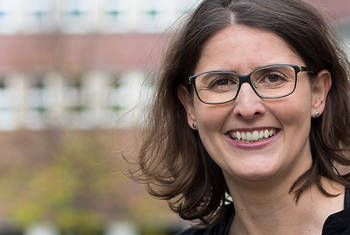Katja Kaufmann What are the Long-Run Effects of Elite Universities on Individuals and Society?
Katja Kaufmann, professor of Applied Microeconomics at Johannes Gutenberg University Mainz, received her doctoral degree from Stanford University. Upon completion of her doctorate, she worked as assistant professor at Bocconi University (Italy) and at Mannheim University. Katja Kaufmann was a visiting scholar at briq (Bonn), CESifo, the Harvard Kennedy School, LMU, Princeton and Yale University. She is a research fellow at briq, CESifo, HCEO, EUDN, IZA and member of the Verein für Socialpolitik. Her work has received international awards, including the CESifo affiliate award, and she acquired third-party funding from the elite program of the Baden-Wuerttemberg Foundation and as one of the PIs of the Collaborative Research Center Transregio (SFB-TR 224) of Bonn and Mannheim University. Her research was published in internationally renowned scientific journals such as the American Economic Review, the Economic Journal, the Journal of the European Economic Association, the Journal of Development Economics and Quantitative Economics and three of her recent papers have been discussed in The Economist article of May 9th 2019.
Area of Research
Labor Economics, Economics of the Family, Economics of Education, Development Economics
since 2020
Professor of Applied Microeconomics
Johannes Gutenberg University Mainz (Johannes Gutenberg-Universität Mainz) (more details)
Department of Economics
2018-2019
Visiting Researcher
briq (Bonn)
2014-2020
Assistant Professor
University of Mannheim (Universität Mannheim)
Department of Economics
2008-2015
Assistant Professor
Bocconi University (Università Commerciale Luigi Bocconi)
Department of Economics and IGIER
2015-2015
Visiting Researcher
IZA - Institute of Labor Economics
2014-2014
Visiting Researcher
Princeton University
2014-2014
Visiting Researcher
Ludwig Maximilian University Munich (Ludwig-Maximilians-Universität München)
2013-2013
Visiting Researcher
Ludwig Maximilian University Munich (Ludwig-Maximilians-Universität München)
CES (Center for Economic Studies)
2012-2012
Visiting Researcher
Yale University
2011-2011
Research Fellow
Harvard Kennedy School of Government
2011-2011
Visiting Researcher
NBER (National Bureau of Economic Research)
2011-2011
Visiting Researcher and Lecturer
Stanford University
Visiting Researcher and Lecturer
2003-2008
Ph.D.
Stanford University
Department of Economics
2003-2005
M.A.
Stanford University
Department of Economics
1999-2002
M.A.
University of Cologne (Universität zu Köln)
Department of Economics (Summa Cum Laude)
1997-1999
B.A.
University of Cologne (Universität zu Köln)
Department of Economics (Summa Cum Laude)
- American Economic Review
- Econometrica
- Journal of the European Economic Association
- Quarterly Journal of Economics
- Review of Economic Studies
- briq – Institute on Behavior & Inequality (Bonn)
- CESifo (since 2010)
- European Development Research Network (EUDN)
- Human Capital and Economic Opportunity (HCEO, University of Chicago)
- Institute of Labor Economics (IZA, Bonn)
- Verein für Socialpolitik (since 2018)
Prizes
- CESifo Distinguished Affiliate Award (2010)
- Bocconi University Research Prize (2009)
- Outstanding Teaching Assistant Award, Stanford University (2007)
Fellowships
- Taube Scholarship Fund Fellowship (SIEPR, Stanford Univ, 2007-08)
- Sawyer Seminar Fellowship (Center for the Study of Poverty and Inequality, Stanford Univ, 2007-08)
- One of the PIs of the Collaborative Research Center Transregio (SFB-TR 224) of Bonn and Mannheim University, Individual Project (joint with co-PI Hans-Martin von Gaudecker) Funded with 500,000€.
- Elite Program of the Baden-Wuerttemberg Foundation (2014)
- IGIER Seedgrant, Bocconi University (2012)


Johannes Gutenberg University Mainz (Johannes Gutenberg-Universität Mainz)
Johannes Gutenberg University Mainz (JGU) is committed to the spirit of its namesake in promoting innovative ideas, in inspiring people, and in using knowledge to transcend boundaries. With more than 31,000 students, JGU is one of the largest universities in Germany. As a comprehensive university, it embraces almost all academic disciplines and also maintains a Medical Center. At JGU, some 4,150 academics, among them 540 professors, research and teach at more than 150 departments, institutes, and clinics. Furthermore, the integration of two art schools is unique in the German higher education sector. Mainz University is an internationally recognized research university. It owes its reputation to its outstanding researchers and their excellent achievements in particle and hadron physics, materials sciences, translational medicine, life sciences, and historical cultural studies. The university's PRISMA+ Cluster of Excellence, where primarily particle and hadron physicists collaborate, is at the cutting edge of international research.
Institute
The Collaborative Research Center (CRC) TR 224 – EPoS
The Collaborative Research Center (CRC) TR 224 – EPoS is a cooperation between the University of Bonn and the University of Mannheim. Funded by the German Research Foundation (DFG), it aims to analyze and provide policy proposals that address three key societal challenges: how to promote equality of opportunity; how to regulate markets in light of the internationalization and digitalization of economic activity; and how to safeguard the stability of the financial system.
Map
What are the longrun implications of elite universities for individuals and society? In this video, KATJA KAUFMANN explores the effects of elite higher education on both marriage and intergenerational outcomes. Employing a regression discontinuity design and an unique data set collected and digitized from Chilean archives and matched with information from the Chilean Ministry of Justice, Kaufmann identifies significant advantages for women in terms of marriage market outcomes (test scores, elite university attendance, family background of husband) as a result of attending an elite university. Furthermore, attendance at such an institution is shown to have clear intergenerational effects, resulting in children performing better in standardized tests. With important implications for educational policy, the research presents important insights for debates around social stratification, social mobility and inequality.
LT Video Publication DOI: https://doi.org/10.21036/LTPUB10837
Elite Higher Education, the Marriage Market and the Intergenerational Transmission of Human Capital
- Katja M. Kaufmann, Matthias Messner and Alex Solis
- Published in 2021








